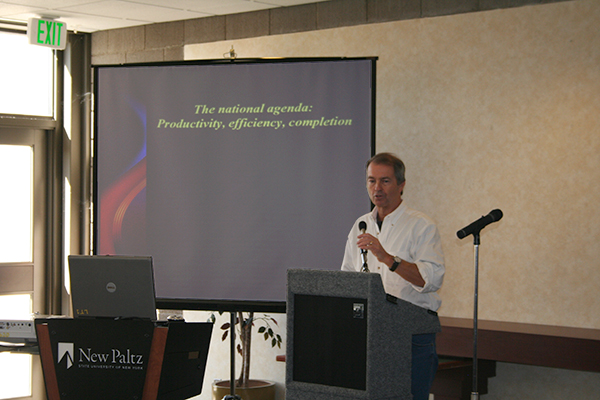

Administrators and faculty members filled the College Terrace Tuesday for a United University Professions (UUP) forum on workload and other issues, showcasing speaker Gary Rhoades.
“Workload, Faculty Voice & Quality In Higher Education” featured Rhoades, who has conducted research on the restructuring of academic institutions and professions in the academy, science and technology policy, and comparative higher education. UUP representatives said they felt the “dynamic speaker” would provide a good start for an event that also allowed faculty to break into small groups and discuss issues they were having with their own workloads.
Rhoades spoke about problems instructors face in regards to their workload and possible solutions that can be applied in front of the approximately 80 faculty members who were in attendance.
“This is something we’ve never attempted before,” UUP President Peter Brown said in his opening remarks. “I think it’s…time we discussed faculty workload.”
Rhoades began his presentation by stressing the importance of understanding the intersection of both faculty and other professionals on campus, something faculty and administrators need to take into account when discussing workload issues.
“There is just no way we can get to this big goal without [the] investment of revenue,” Rhodes said. “We don’t have an…efficency problem. We have a capacity and investment problem.”
President Donald Christian agreed that issues pertaining to workload — which can relate to the number of courses a professor teaches, the number of students and advisees they are responsible for, their personal research, their service on committees and more — are being discussed in colleges and universities across the United States.
Christian, who attended the forum, said he hopes faculty at SUNY New Paltz will remain patient and understanding if they are asked to take on more responsibility.
“There are some faculty that deans have asked to pick up heavier teaching loads because they’re not carrying scholarly responsibilities, and naturally there’s some resentment about that,” he said. “Some of the conversation has been about how we address inequities in teaching loads.”
Professor Patricia Noble, an adjunct who teaches interpersonal communication and public speaking, said she attended the forum hoping to hear about issues regarding the workload and treatment of part-timers.
“I am wondering if they can make the point that adjuncts need to be treated more fairly,” Noble said. “The more involved you are, the better it is for students.”
The presentation included statistics regarding the hiring of faculty and enrollment of students both throughout the SUNY system and specifically on the SUNY New Paltz campus.
According to Rhoades’ presentation, there was a 13.3 percent increase in students versus a 9 percent increase in faculty from 2005-11 across the SUNY system.
On the SUNY New Paltz campus, the total full-time faculty dropped from 323 members in 2010 to 313 in 2011, where part time faculty dropped from 325 in 2010 to 293 in 2011. Rhoades also said the student-to-faculty ratio rose from 16-to-1 to 17-to-1 over the last year.
“The numbers might not be perfect,” Rhoades said. “It’s the trend line that matters.”
Rhoades ended his presentation by urging members of the faculty to do a self-survey that would allow both administrators and professionals on campus to be on the same page about issues concerning those on campus.
Administrators said they are in the process of working on a survey to send out to faculty to evaluate their workloads, while UUP sent out their own faculty survey online about three weeks ago.
UUP Vice President of Academics Jeff Miller said while he does not know what stage the administrative study is at, UUP members are trying to get some ideas about where faculty spend their time and on what.
“Different departments have different workloads,” Miller said. “Part of the trick is seeing where everyone is.”
Rhoades said it “made sense” if both the administration and UUP worked together to tackle the faculty workload issue.
Miller said he thought the turnout, both on the faculty and administrative side, was encouraging.
“It was more than we expected and more than who had previously signed up,” Miller said. “It’s important because it effects everyone on campus. For us, it’s where the rubber hits the road — we need to maintain quality in the class room which is hard to do when [workload] goes up.”
